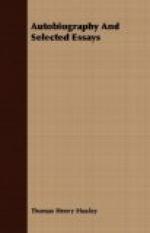As to Huxley’s appearance, and as to the impression which his personality made upon others, the description of a friend, Mr. G. W. Smalley, presents him with striking force. “The square forehead, the square jaw, the tense lines of the mouth, the deep flashing dark eyes, the impression of something more than strength he gave you, an impression of sincerity, of solid force, of immovability, yet with the gentleness arising from the serene consciousness of his strength—all this belonged to Huxley and to him alone. The first glance magnetized his audience. The eyes were those of one accustomed to command, of one having authority, and not fearing on occasion to use it. The hair swept carelessly away from the broad forehead and grew rather long behind, yet the length did not suggest, as it often does, effeminacy. He was masculine in everything—look, gesture, speech. Sparing of gesture, sparing of emphasis, careless of mere rhetorical or oratorical art, he had nevertheless the secret of the highest art of all, whether in oratory or whatever else—he had simplicity.”
Simplicity, directness, sincerity,—all these qualities describe Huxley; but the one attribute which distinguishes him above all others is love of truth. A love of truth, as the phrase characterizes Huxley, would necessarily produce a scholarly habit of mind. It was the zealous search for truth which determined his method of work. In science, Huxley would “take at second hand nothing for which he vouched in teaching.” Some one reproached him for wasting time verifying what another had already done. “If that is his practice,” he commented, “his work will never live.” The same motive made him a master of languages. To be able to read at first hand the writings of other nations, he learned German, French, Italian, and Greek. One of the chief reasons for learning to read Greek was to see for himself if Aristotle really did say that the heart had only three chambers—an error, he discovered, not of Aristotle, but of the translator. It was, moreover, the scholar in Huxley which made him impatient of narrow, half-formed, foggy conclusions. His own work has all the breadth and freedom and universality of the scholar, but it has, also, a quality equally distinctive of the scholar, namely, an infinite precision in the matter of detail.
If love of truth made Huxley a scholar, it made him, also, a courageous fighter. Man’s first duty, as he saw it, was to seek the truth; his second was to teach it to others, and, if necessary, to contend valiantly for it. To fail to teach what you honestly know to be true, because it may harm your reputation, or even because it may give pain to others, is cowardice. “I am not greatly concerned about any reputation,” Huxley writes to his wife, “except that of being entirely honest and straightforward.” Regardless of warnings that the publication of Man’s Place in Nature would ruin his career, Huxley passed on to others what nature had revealed to him. He was




